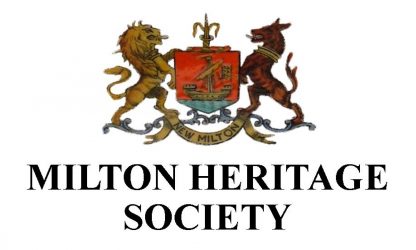Driving along Ashley Road from the traffic lights in the centre of New Milton you will see on the right a large white building behind some trees. This is Ashley Arnewood. It is now a nursing home but was once the home of a most remarkable man, the Honourable Auberon Herbert. He lived there from 1872 to 1886.

Auberon Herbert was the third son of the Earl of Carnarvon. He was born in Highclere in 1838 and educated at Eton and Oxford. In 1858 he purchased a commission in the army and served in India. On his return to England he returned to Oxford where he lectured in history and jurisprudence at St John’s College.

He had a great love of adventure and also was a very compassionate man. He was a witness to the Prussian Danish war of 1864 where he was made a knight of the order of Dannebrog in recognition of his services in leaving the Danish lines to go out into no man’s land to rescue the wounded. Auberon also visited the United States and witnessed some of the battles of the civil war. He was present in France during the Franco Prussian war and was one of the first outsiders to be allowed into Paris after the city surrendered to the besieging Prussian forces.
Auberon Herbert made several attempts to become an MP. He failed to be elected on the Isle of Wight and again in Berkshire. Finally he was elected in a bye-election as MP for Nottingham. He was a radical politician and within the first two weeks of entering parliament he was advocating that all state schools should be non religious. He also described the House of Lords as ‘a body wholly irresponsible’ and urged the Commons to take action against the Lords ability to veto bills. His love of wildlife came to the fore when he was one of the leading MPs to support the 1872 Wild Birds Protection Act. As a young man Herbert had been a keen game sportsman. He gave this up and became a vegetarian as he objected to all forms of killing, including the slaughtering animals for food. Herbert believed that the law of equal freedom was the supreme moral law. He became an advocate of the philosophy of Herbert Spencer and promoted his own thoughts which became known as ‘voluntaryism’. In essence this was a belief that government should be limited to just defending private ownership and individual rights and not initiating force against the people. He called for a system funded by non- coerced contributions, in other words, voluntary taxation. Those who contributed to the government funds would be entitled to vote. Those who made no contribution could not. Herbert organised anti government protests in London, notably one in Hyde Park in opposition to an anticipated war between Britain and Russia. Many thinkers of the time were calling Auberon Herbert an anarchist but others disagreed. He was certainly a great crusader for liberty and equality.

On leaving politics Herbert purchased, in 1873, Ashley Arnewood in Milton Parish and took up farming. He worked hard to improve the standard of living for farm workers. Those lucky enough to work for Auberon were paid an extra two shillings a week above the normal wage. He also encouraged local farm workers to form a union to assist in their struggle for better conditions. For one week of the year he offered free meals to all people in the locality including Gypsies. When Mrs Girling and the religious sect known as ‘The Shakers’ were evicted from their house in Vaggs Lane Hordle, in a winters storm, Auberon Herbert took them in and gave them temporary shelter in one of his barns at Ashley Arnewood.
In 1871 Auberon married Lady Florence, the daughter of the Earl of Cowper. They had four children. Sadly their eldest son died in childhood. Their second son, Auberon Thomas Herbert, inherited the title of Lord Lucas from his maternal uncle. He entered politics in the House of Lords and served as private secretary to the Secretary of State for War Richard Haldane. During the First World War he trained as a pilot in the Royal Flying Corps but was shot down and killed during the closing stages of the battle of the Somme in 1916. He is commemorated on the New Milton war memorial.
After the death of his wife in 1886, Auberon Herbert sold Ashley Arnewood and moved to premises in Burley known as ‘The Old House’. He continued in his eccentric ways, refusing to have a fire lit in his room and insisting on the windows being open. It was here in 1906 that he died and in accordance with his wishes he was buried in the grounds of his house.

Auberon was a controversial figure in late Victorian life. He was an early champion for liberty and equality. He had some unconventional views on government but he was a supporter of the ordinary working people. It is little known, until now, that this man spent the latter part of his life in Milton Parish.
Auberon Herbert’s name lives on in New Milton as the residents of Herbert Road will testify.

